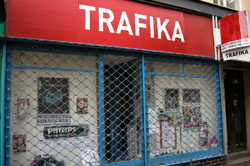
Financing of the local media
Until better times – after the elections

According to current regulations, local self-governments independently decide on how to fulfill their legal obligation to provide informing at the local level and which media outlets will receive the funds. The lack of a regulated system of allocation of budget funds intended for the media, and independent decision-making within local self-governments about the expenditure of their funds, have led to extremely varied practical results in Serbia.
What is it like in practice?
Last year in Cacak, the mayor of the city has signed contracts with certain local media outlets without any public contest or public invitation of offers. Just for the case, the signed contracts have a provision that allows their immediate termination.
In Krusevac, a public contest was organized, but one of its requirements was that eligible local print media outlets should own at least two printing machines. Only the Pobeda newspaper could meet this requirement, while the newspaper Grad was ineligible for the public contest since it is printed in Belgrade.
In Pirot, a public contest required, among other things, "a proof of good cooperation with the local self-government", as well as "established tradition in the local media scene". Therefore, a local newspaper, Pirotske Novine, known for its critical approach towards the local self-government, was eliminated from the public contest on both counts. In order to participate in the contest, local electronic media in Pirot were required to have "a high-quality programme". It was unclear who would judge the quality of the programme.
In Vranje, only the municipal media outlets have received funds, while in Leskovac the money went to a pirate radio station.
Precisely for these reasons, the Independent Journalists' Association of Serbia (NUNS), the Association of Independent Electronic Media (ANEM) and Local Press began working mid-last year on recommendations about financing of the local media. The initiative was accepted by the Ministry of Culture and the Ministry of Local Self-Government. At a press conference held on June 15 last year in the Media Center, the ministers, Nebojsa Bradic and Milan Markovic, gave their public support to efforts to introduce changes in the way local media are financed, and promised to do everything in their power to implement the recommendations.
Later, on August 28, the representatives of NUNS, ANEM and Local Press, delivered to all ministries a proposal of recommendations for financing of the local media.
The main idea was to finance the public interest, i.e. media content, not the salaries of the employees, and to introduce per-project funding instead of subsidies. The proposal clearly defines a whole system of financing intended to ensure transparent allocation of funds, organization of public contests and formation of independent committees, as well as implementation of clear criteria and involvement of the public in the process of decision-making.
The proposed recommendations emphasize that total funds used for this purpose should be allocated "under equal and non-discriminatory conditions for all media outlets that can meet the application requirements, without favoring local public media companies that have been founded by local self-government, while public contests should be organized regularly, after specified time periods."
It was also proposed that the criteria for selection of projects in public contests "should be limited to the significance of the projects in relation to the exercise of the right to public informing at the local and regional level; their contribution to diversity of media content and pluralism of ideas and values at the local and regional level; sound justification of the projects; adequate specification of project budgets from the viewpoint of planned project activities; and sustainability of the projects, while possible additional criteria for selection of projects should be agreed with journalistic and media associations."
The recommendations also envision formation of independent committees comprised of "competent representatives of the public, professional associations and the non-governmental sector." The results of public contests should be published on web sites of local self-governments, while each rejected applicant should be given an explanation for such decision.
Of course, the recommendations also include a mechanism that would ensure control of the media with regard to both their programme and finances.
Despite persistent efforts, several meetings with representatives of ministries and mutual correspondence, today – nine months after NUNS, ANEM and Local Press submitted a Proposal of Recommendations for Financing of Local Media – the process has not moved from the starting point and local self-governments have not changed their usual behavior. The lack of political will to solve this important issue before the adoption of a long-term media strategy has led not only to further abuse of taxpayers' funds and financing of partisan media outlets, but also to closure of many local outlets who were unable to survive in an environment characterized by unfair competition.
The government has once again acted irresponsibly towards the local media and in favor of its own interests, without any desire to relinquish the influence afforded by the existing system of financing. The local media, pressured by the economic crisis, are increasingly often forced to choose between closure and sycophantic reporting in the interest of arrogant local power figures.
Will anything change?
Instead of an answer, we should remind ourselves that we are at the beginning of an election year, which means that the recommendations will remain shelved until some better times. And such times will certainly come.
After the elections.
Vukasin Obradovic
MC Newsletter, April 21, 2011
View all comments (0) Leave a comment
Published comments contain opinions that are not the opinions of Media Center. Responsibility for the content of messages and their accuracy lies on the website users who posted them.
 |
| The content of this article does not necessarily reflect the view of the Media Center. The author bear full responsibility for the content of the text. |







